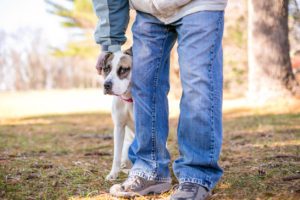Pandemic Puppy: How to Train and Socialize Dogs After the Covid-19 Pandemic
Did you adopt a puppy during Covid-19 lockdowns? Have you now realized that your dog is not as well-adjusted or socialized as they should be? Are you looking for ways to help your dog feel better about being around other dogs and humans alike?
“Pandemic puppy” problems have been common in pets adopted during lockdowns. In the article below, you’ll find a list of suggestions you can try when you need to socialize a dog following lockdowns. Read through this information to get some ideas for your pet.
Getting Your Shy Dog Outside
Because of the nature of a pandemic, your pandemic puppy has probably been staying in the house a lot more than a regular dog would. It’s important to get your dog out and around other pups more after lockdowns. While your dog may seem awkward or shy at first, this will help them in the long run.
Plenty of Walks
First and foremost, it is necessary to take your dog on plenty of daily walks to help them get used to their surroundings. Walking, especially in places where you may see other dogs or humans, is a great way to teach your dog proper interactions.
Additionally, regular daily walks can help your dog get physical and mental exercise that helps them stay calmer at home. Although daily walks likely won’t be enough on their own to socialize a nervous dog, they can help you get started and create a strong framework as well.
Dog Park Visits
Dog park visits can go a long way toward helping your dog learn how to interact with other dogs and humans. Going to the dog park allows your dog a brief opportunity to spend time with other dogs and learn more about canine body language as well.
While at the dog park, other humans may want to try to pet and interact with your pet, too. If they aren’t aggressive, you can let them try; however, if they are too fearful, ask them to stop trying to interact with your dog until they settle down a bit. Do not push your dog in these situations.
Doggie Daycare
If your dog likes to be around other dogs, isn’t aggressive, and isn’t too fearful of them, then doggie daycare may be a great way to get them used to the idea of interacting with others. They can play freely with dogs at daycare and will also get used to having daycare staff handle them.
Doggie daycare works well for dogs who have already been somewhat socialized but need a little extra encouragement or practice. However, it may be overwhelming for dogs who haven’t learned basic socialization yet, so keep this in mind.
Training Your Dog to Socialize
In addition to getting your dog out and around other dogs, training them can be helpful. There are a number of things your dog should be trained to do while learning how to socialize with others.
Training for Attention
It is very important to teach your dog several commands you can use to get their attention away from other dogs, humans, or animals they see outside. The first of these is simple: just make sure they look at you every time they hear their name. This way, you can break their attention from whatever they are focusing on just by calling to them.
From there, you can teach them look (or “look at me”), wait, and leave it. These commands are all excellent methods of encouraging your dog to pay attention to you and your walk, rather than to people and dogs in their environment.
Training for Patience
It is equally important to teach your dog training commands to use for keeping them patient, too. If your dog is extremely excited to go see another dog or human they have encountered, but you want them to wait patiently, you need to work on their sit, lay down, wait, and stay commands.
Each of these four commands can be easily taught at home. However, without high-value treats, your dog is unlikely to want to perform these commands when they are out and exploring their surroundings. Bring along some of her favorite food or treat items to encourage them every time you see another dog or human outside.
Professional Dog Training
If all else fails and your dog is not responding well to personal at-home training, you may need to work with a professional dog trainer instead. A professional trainer will help you find the best way to train your dog and work on your own ability as a home trainer, too.
With the help of professional dog training, your dog will learn quickly and will start to show signs of improvement, even when it comes to anxiety and reactivity.
Conclusion
With the help of the information outlined above, you should have a better idea of how to help your dog become more socialized, even if they haven’t been around other dogs or humans much. Use this guide to figure out some new strategies for working with your pet to help them become more confident in new situations.
If you feel like your dog’s anxiety is not responding to any type of training or exposure, you may need to talk to your vet about anti-anxiety medication for your pet. Otherwise, however, stay focused on your dog’s training needs and you’re sure to quickly see results.
If your dog is struggling with social anxiety near Matthews, NC contact our team at Caring Hearts Animal Hospital. We’ll make sure to check if your dog has an underlying condition and help develop a treatment plan tailored to your pet’s needs. Make an appointment for your dog by calling us at (704) 893-2799 or by scheduling an appointment online.

